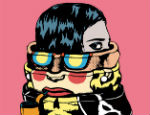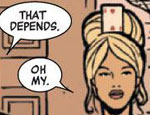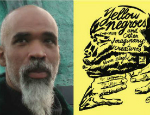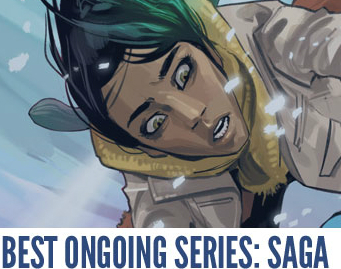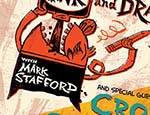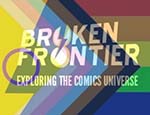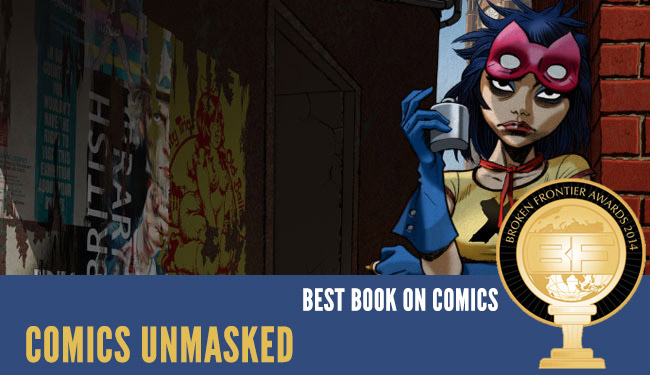
Comics Unmasked is not just a reminder of the darker and more esoteric layers of British comics history but also of the power of the medium as a tool of dissent to question authority…
So strong a year was it for comics scholarship that it could easily be argued that 2014’s Broken Frontier Award for Best Book on Comics was defined as much by the books that didn’t make it on to the shortlist ballot as by those that did. From biographies to reference works to academic studies on the form, it was a period where the breadth and quality of comics discussion and analysis on the printed page was a direct mirror to another twelve months of exhilarating practice in this new Golden Age for the medium.
In the UK there was no better example of the continuing rising profile of comics as an art form, and their acceptance on a far wider stage, than the Comics Unmasked exhibition that ran throughout the summer at the British Library. Curated by Paul Gravett and John Harris Dunning, Comics Unmasked provided a unique opportunity to experience items from the British Library’s vast comics collection for the very first time in the largest such event ever to be held on these shores.
The accompanying book, Comics Unmasked: Art and Anarchy in the UK, is not merely a catalogue of some of the show’s carefully selected exhibits from the BL’s archives but also a record of its objective to underline to visitors that comics should not be viewed as merely wistful, innocuous, childhood nostalgia but as an often provocative and adult medium with the power to subvert and challenge.
Those expecting a conventional and linear potted history of British comics publishing when they attended Comics Unmasked last year, then, would have been sorely disappointed because Gravett and Dunning’s approach to being given access to the British Library’s vaults was to be a far more nuanced, stimulating and inventive one than that – all captured for posterity in the pages of this year’s Broken Frontier Best Book About Comics Award winner.
From the worlds of self-publishing to the work of superstar creators like Alan Moore and Grant Morrison, Comics Unmasked gives us a near 200-page spotlight on British sequential art at its most controversial, rebellious, exploitative, confrontational and surprising. Through centuries of history it takes in the likes of the Illustrated Police News of the 1880s, Ally Sloper, early 20th century suffragette strips, Milligan, McCarthy and Swain’s Skin, Darryl Cunningham’s graphic journalism, David Britton’s Lord Horror, IPC’s contentious Action weekly from the 1970s, Nasty Tales, V for Vendetta, Dope Fiend Funnies, Gareth Brookes’s The Black Project and so much more; all given context within the book’s six sections that divide the material into analyses of violence, sexuality, society, politics, heroes and altered states in UK comics.
Comics Unmasked is not just a look back at the darker and more esoteric layers of British comics history but also of the power of the medium as a tool of dissent to question authority – an influence that has historically led to its suppression, trivialisation and censorship by an establishment that fears it. It would have been so easy for Paul Gravett and John Harris Dunning to have exploited the rich pickings of the British Library’s acquisitions to provide another comfortable and safe overview of the industry that played on cosy reminiscence to bring in an audience. It is to their absolute credit that they chose instead to remind us of what an unpredictable, influential, and often uncompromising means of communication comics are.
Given the scale of this achievement, and the enormous success of the exhibition that spawned the book, the choice of the Broken Frontier readership and staff to give our 2014 Best Book About Comics Award to Comics Unmasked: Art and Anarchy in the UK is a most fitting one, and let us not forget that it also marks a back-to-back triumph for Paul Gravett in this category over the last two years!





